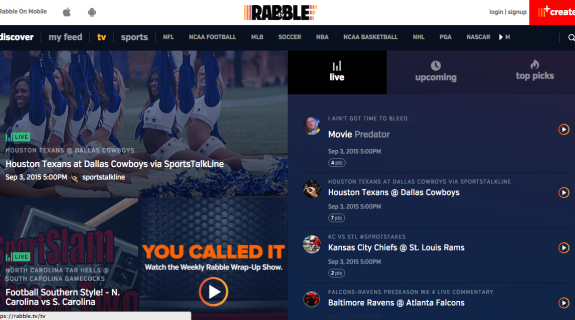Growing up in Seattle, I was by default a fan of the Mariners (certainly not by choice), a mostly inept Major League Baseball team whose disappointing seasons were consistently salvaged by one of the greatest voices in the history of radio – game announcer Dave Niehaus (RIP). So enamored was I of Niehaus, that when alone, I would sometimes put the game on the television, then turn the sound off, and then try to announce it myself in a feeble attempt to evoke the same level of passion and drama that he did in the confines of our Doritos-stained rec room .
The impulse to call ballgames has not left me, though I have learned to resist it, if only to spare those who would endure it, such as my wife. But with the re-launch of RabbleTV this month, a social platform that lets users create and share their own audio broadcasts of live sports and other televised entertainments, defying that urge just got a whole lot harder.

Rabble was initially launched last April, at the start of baseball season, with a scaled-down interface that did little more than let the community “throw everything out there, vote it up and fend for themselves,” said co-founder Glenn Hopper. Almost from the get-go, however, he and co-founder Ryan Tyrrell “started seeing such varied content that really quickly we realized we’re less like Reddit and more like a broadcast medium where people are looking for channels and wanting to navigate it better… We realized we’re going to need to make this slicker because we’re competing against big media companies and we need to start looking more like them.”
A complete overhaul ensued, after which Rabble 2.0 emerged with cool features such as live sports data, improved navigation to sports categories and TV shows, personalized broadcast feeds that make it easier for fans to listen to their favorite broadcasters, and shiny new mobile apps for iOS and Android devices. Yes, with Rabble, all today’s aspiring broadcasters have to do is hold a phone to their ear to let a global audience tune in to their breathless commentary.
Though currently very much a sports-driven platform, the potential for Rabble as a second-screen engagement offering goes far beyond announcing ball games. To date, users have live-recorded everything from witty, Mystery Science Theater-style film commentary to serious, DVD-bonus-footage-style film analysis, to improvised overdubs of character voices. One of the platform’s most popular users is a Bachelorette blogger whose hilarious live commentary of the most recent season’s episodes has garnered thousands of listens.

“As we started on the TV side of it, beyond sports, we realized people were always congregating around live events,” said Hopper, who very much sees Rabble as a “companion app that goes along with TV shows.” With Twitter and Facebook, “people are already talking about live content anyway,” he continued, “this just gives them another dimension where they can actually take over the mic and do their own riffs.”
For now, Rabble’s founders are focused on growth over revenue, but its format “would suggest the Pandora model of audio ads” down the road, said Hopper. And of course the potential for partnerships are limitless, especially with providers of television looking for ever-more innovative ways to get viewers to tune in. Whatever occurs, “the goal as a company is, we always want this to be free for users,” Hopper continued, which means the next generation of young, announcer-obsessed baseball fans will always have a place to hone their craft – and this time, the world be listening.
Tags:













































__twocolumncontent.jpg)











